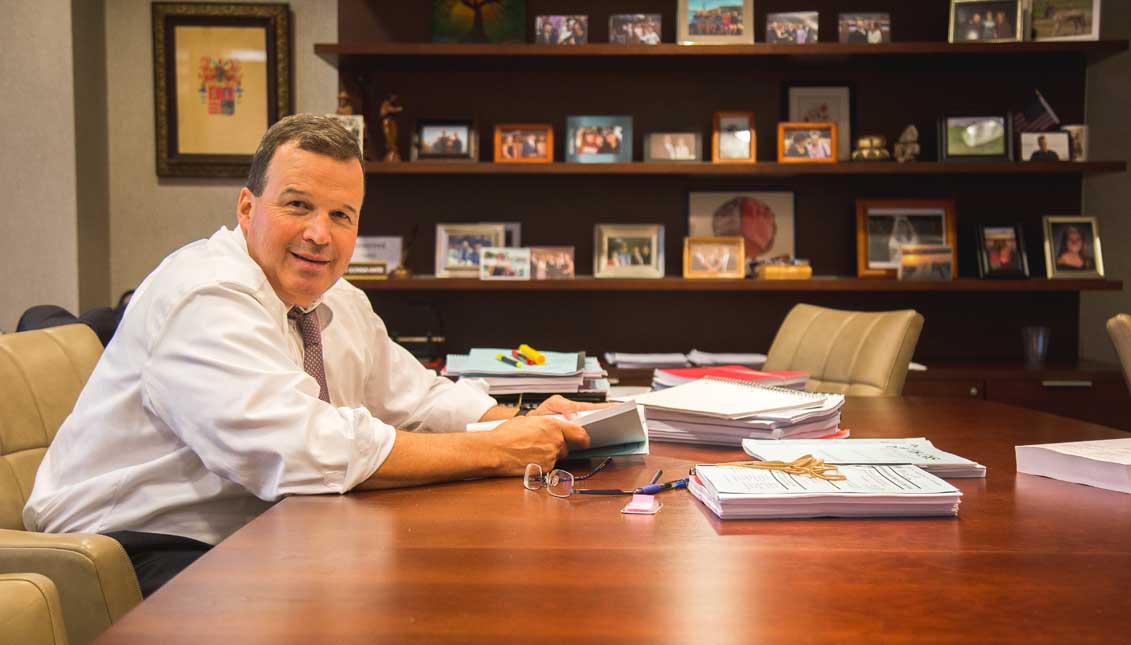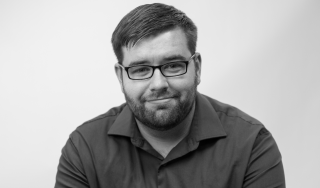
Judge Felipe Restrepo: 'You have to engage in your democracy'
Circuit Court Judge L. Felipe Restrepo spoke with AL DÍA about how a Colombian immigrant became a high-ranking official in the U.S. judiciary.
As the U.S. continues to grapple with a political climate in which many groups of immigrants, especially those of Latino origin, are demonized by incessant voices on the far right, L. Felipe Restrepo does not see himself as “a political statement.”
“But I think it’s worth remembering that we are a country of immigrants,” Restrepo said during an interview with AL DÍA. “Everybody in this country came from somewhere else, if not directly, then two or three or four generations back.
“I think we all need to step back and understand that the greatness of this country is the fact that people have come from all over the world to make it what it is,” he continued.
In that regard, it’s safe to say that Restrepo is doing his part.
Restrepo was born in Medellín, Colombia, and immigrated to the U.S. as a child with his family in 1962. During the 1980s, he began a career in law and in 2012, President Barack Obama nominated Restrepo to be a judge of the U.S. District Court for the Eastern District of Pennsylvania. He was sworn into office in 2013.
Obama went on to appoint Restrepo to a judgeship of the U.S. Court of Appeals for the Third Circuit. His candidacy earned bipartisan support from Senators Bob Casey (D) and Pat Toomey (R). Restrepo began this role in January 2016.
On Oct. 10, Restrepo will be recognized by AL DÍA along with four other honorees with a Hispanic Heritage Award at the third annual Hispanic Heritage Awards Luncheon at the Union League of Philadelphia. The event is held in celebration of Hispanic Heritage Month, which runs from Sept. 15 through Oct. 15.
The ceremony is designed to honor leaders of Hispanic origin for their exceptional contributions in different professions in the Philadelphia region. Restrepo will be honored in the field of Public Service. The remaining honorees, who will also be the subject of AL DÍA cover stories prior to the ceremony, are:
• Alba Martinez, Principal, the Vanguard Group (Business)
• Dr. Jose Russo, Director, Fox Chase Breast Cancer Research Lab (Health)
• Dr. Gloria Bonilla-Santiago, Distinguished Professor, Rutgers University-Camden (Education)
• Peter Gonzales, President & CEO, the Welcoming Center for New Pennsylvanians (Non-Profit)
When Restrepo made the decision to pursue a career in law, it wasn’t clear whether he would ever be able to practice it due to his immigration status.
“At that point, I was kind of gambling, quite frankly,” the judge recalled.
Restrepo had what is known as a G-4 visa, which he described as “an international civil servant-dependent visa.” Basically, Restrepo’s status in the U.S. was contingent on his father’s career.
“We had papers, we were documented, it was all good, all legal,” Restrepo said. “But it was kind of tenuous only because it was tethered to my father’s position.” Restrepo’s family first immigrated to the U.S. after his father was offered a job as an economist for the Alliance for Progress.
Despite this uncertainty, after obtaining his bachelor’s degree from the University of Pennsylvania in 1981, Restrepo enrolled in Tulane University Law School in New Orleans, Louisiana.
In 1986, the year that Restrepo completed his studies at Tulane, President Ronald Reagan signed a piece of immigration reform legislation that is commonly known as the Simpson-Mazzoli Act. A provision of this bill provided a pathway to citizenship for immigrants like Restrepo who could prove continuous legal residence in the U.S. for 20 years or more.
Restrepo would go on to take his oath of citizenship in Philadelphia on Sept. 7, 1993.
Restrepo’s parents met during a class at the University of Pennsylvania in 1955 — his father from Bogotá, Colombia, his mother from Madrid, Spain.
The couple would begin raising their family in Colombia, and even after Restrepo’s father accepted his job in the U.S., Restrepo said he had always expected that the family would return to South America.
“I don’t think my parents ever intended… Well, I know that they didn’t intend to stay,” Restrepo said. “But the situation in Colombia became very unpredictable, extremely violent.”
The judge is referring to the Colombian conflict fueled by the illegal cocaine trade, or the “Narco Wars,” which raged in the country throughout the 1970s and 80s. Restrepo’s parents decided to stay in the U.S. until the situation improved in Colombia.
RELATED CONTENT
“Things didn’t stabilize in Colombia for many years so we made our life in the United States,” Restrepo said, adding that the violence in Colombia made it difficult, if not impossible, for the family and other Colombian immigrants to obtain U.S. citizenship at the time.
After finishing his undergraduate studies, Restrepo worked at a law firm in Washington, DC, that represented professional athletes. The firm did “both the business end of the deal and the legal end of the deal.”
“I realized that you could do everything in business with a law degree, but you couldn’t practice law with a business degree,” Restrepo said. “I thought that the law degree would give me more opportunity down the line.”
So Restrepo enrolled in law school at Tulane, where, he said, “the single most important class” he took was a criminal defense clinic where he worked with a lawyer to represent people accused of crimes in the local Orleans Parish.
“I really enjoyed that work. I thought I could do the work well. I thought I could make a difference,” Restrepo said. “It appealed to my sense of social justice.”
Soon after finishing law school, Restrepo accepted a position as a public defender at the Defender Association of Philadelphia, where he worked for three years before starting a firm with Larry Krasner, who is now Philadelphia’s district attorney.
Restrepo said he spent 13 years in private practice with this firm, doing primarily civil rights and criminal defense work. During this time, he represented many economically disadvantaged individuals and “people whose rights had been compromised by the authorities.”
Restrepo went on to become a U.S. magistrate judge, and then President Obama nominated him to be a district court judge, an experience that he referred to as “very flattering and very humbling.” When the White House called him again to ask if he would consider a circuit court appointment, the judge admits he was slightly hesitant at first.
“It’s nothing I ever pursued because I really didn’t fancy myself an appellate lawyer,” Restrepo recalled. “But I have a world of respect for President Obama, and when they call and ask you to do something like this, it’s tough to say no.”
When asked what he thinks his role as a high-ranking official in the judiciary means for young Latinos, Restrepo said: “I think it’s important for Latinos to understand they can do whatever in this country. This country really is a country of opportunity, and you have to take advantage of the opportunity.”
On building success, Restrepo emphasized that “you can’t be afraid to ask for help.”
“I realize that I could have never accomplished any of this if I hadn’t been willing to ask for people to help me,” he said, adding that he now strives to provide the younger generation with mentorship and networking opportunities.
“I’m a resource if they need to talk to somebody, whether it be what sort of law they want to practice or whether they even want to be a lawyer,” the judge said.
For Restrepo, “citizenship is not a spectator sport,” and he urges everyone to get involved in the democratic process.
“You have to engage in your democracy. You can’t just sit on the sidelines and throw rocks and complain,” Restrepo said. “This is kind of cliche, but you have to be the change you want to see in the world.”










LEAVE A COMMENT: